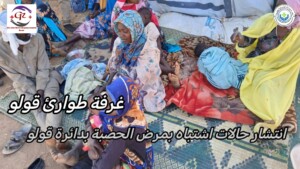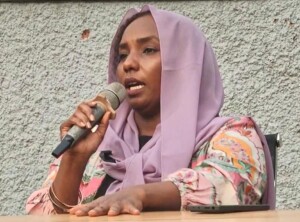341 clear of coronavirus and discharged in Sudan
According to the Sudanese Ministry of Health 47 people are still in isolation in two centres in Khartoum because of a suspected coronavirus (Covid-19) infection. In total, 341 people have been cleared and discharged from quarantine.
 A tea seller in El Fasher (Social media)
A tea seller in El Fasher (Social media)
According to the Sudanese Ministry of Health 47 people are still in isolation in two centres in Khartoum because of a suspected coronavirus (Covid-19) infection. In total, 341 people have been cleared and discharged from quarantine.
Two cases of Covid-19 have been confirmed in Sudan as of March 21. One patient died.
During the border opening to allow Sudanese residents from abroad to re-enter Sudan on <arch 20 and 21, a total of 413 people arrived and were screened through Khartoum airport, Port Sudan seaport and the border with Chad.
People coming from countries with local transmission must stay in home isolation for 14 days. A government-sponsored call centre was activated on 19 March to answer all questions related to COVID-19. The call centre, for all Sudanese residents, operates 24 hours a day/7 days a week.
Jabra Hospital (88 beds capacity) in Khartoum is equipped to receive COVID-19 cases, including suspected, confirmed and severe cases that require Intensive Care Unit admission. A dedicated quarantine building will be used to monitor contacts of confirmed cases and for monitoring recovered COVID-19 patients before they are discharged.
Kordofan
The Forces for Freedom and Change (FFC) in Abu Jubeiha in South Kordofan warned of the dangerous conditions in the eastern localities of the state in the event of a corona epidemic. They point to “the fragility of the population’s health and the open borders with South Sudan”.
The FFC called on the federal health authorities “to go to the province and provide the necessary support to combat the corona epidemic”.
The health authorities in El Obeid in North Kordofan reported on Saturday that one suspected case of coronavirus in El Obeid is held in quarantine at home.
Ali Ibrahim, a leading member of the Sudanese Professionals Association (SPA), reported that the suspected case is a Sudanese coming from Belgium. Blood samples have been sent to the National Health Laboratory (Astak) in Khartoum. The results were still unclear on Sunday.
Kassala
In eastern Sudan, the governor of Kassala, Maj Gen Mahmoud Babiker, issued a health emergency order to confront the coronavirus that applies for a period of two months and is extendable by the state. The emergency order bans gatherings for any purpose, such as rallies, marches, demonstrations, religious celebrations, weddings and visits to clubs, cafes, shisha (hookah) lounges and sports stadiums. Itinerant merchants will be confined to designated sites in Kassala city.
The emergency order also includes closing the border with Eritrea, except for Sudanese stranded abroad that wish to return to Sudan, or foreigners wishing to leave the country. Those allowed to enter Sudan will be subjected to quarantine measures to be decided upon by the health authorities of the state.
Tea sellers
Aisha Mousa, member of the Sovereign Council and chairperson of the Community Committee, received recommendations of that committee to contain negative effects of coronavirus precautions towards food and tea sellers. She pledged to implement these recommendations.
Radio Dabanga’s editorial independence means that we can continue to provide factual updates about political developments to Sudanese and international actors, educate people about how to avoid outbreaks of infectious diseases, and provide a window to the world for those in all corners of Sudan. Support Radio Dabanga for as little as €2.50, the equivalent of a cup of coffee.












 and then
and then